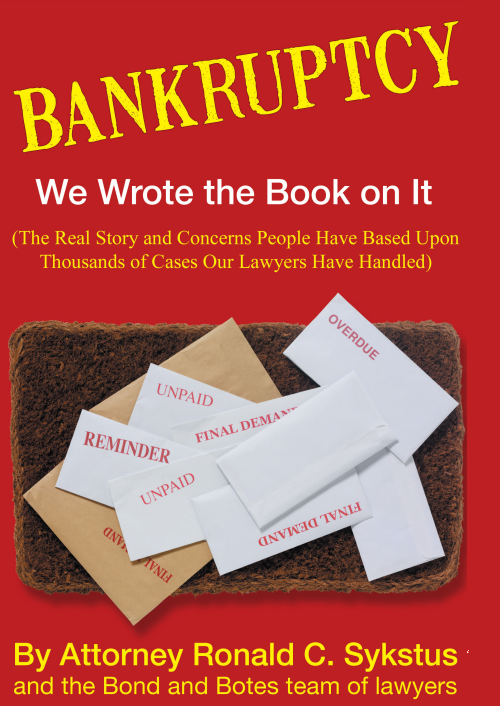FREE Download - Click on Book
Chapter 1 – Introduction – The Stress and Worry of Debt
We are often asked what our clients are like. Are they young or old? Are they Caucasian, African-American, Hispanic, or Asian? Are they married or single? What kind of jobs do they have? Are they lawyers, doctors, dentists, engineers, cashiers, teachers, construction workers, or waitresses? Are some of them unemployed? Do they own homes, beach homes, vacation homes, or office buildings? Are they 18 years old? Are they 25 years old? Are they 35 years old? Are they 45 years old? Are they 55 years old? Are they 65 years old? Are they 75 years old? Are they 85 years old? Do they have high school degrees? Do they have college degrees? Do they have master’s degrees? Do they have professional degrees? Do they have law degrees? Do they have medical degrees? Do they have PhDs? You get the picture. Our clients are all of these people. Debt and the stress of debt does not discriminate. It happens. As the saying goes, unfortunately, bad things sometimes do happen to good people.
Along with being asked what our clients are like, the next question we get usually revolves around some aspect of whether our clients simply run up debt and then gleefully look for ways to get around paying back the debt. That is absolutely and patently false. In the almost 25 years of our law practice, we have encountered very few individuals who willfully ran up debt and then tried to get around paying back the debt. Needless to say, we declined to represent these people. While not an empirical study, this assessment covers thousands upon thousands of people, all fitting the vast array of people as described above who are our clients. We start with the premise that people want to pay back their debt. The absolute last place they want to be is sitting in one of our offices. We understand that, and that is the approach we take in discussing all issues with our clients. We search for ways for people to work out and pay their debt without doing damage to themselves, if there is any possible way to do that.
Why do people come to our offices? It is really rather simple. The stress and worry of their situation makes them feel like they have no place to turn. Obviously, if someone has no debt issues at all, is completely current on all their bills, and has savings in the bank, then they do not need to see us about debt problems or issues and they may come to us for other reasons such as tax or student loan issues (more on that later). People come to us for financial consultations if they are feeling overwhelmed with their debt situation and believe that they will not be able to make some or all of the payments that are due on next month’s bills. They may be getting collection calls from both creditors and/or debt collectors to their home, work, or cell phone numbers. They may be receiving threatening collection letters from creditors and debt collectors. They may be served with a lawsuit by the county sheriff or in the mail. They may receive a garnishment of their wages. The IRS or state taxing authorities may be threatening a levy of their wages. They may be being threatened with an automobile repossession by their car creditor. Their mortgage company may be threatening to foreclose on their home or, worse, a foreclosure action may already have been started.
One of the above is usually the start point for us with any prospective new client that comes to our office. Our system and philosophy are pretty simple at this point. No one knows their own individual debt situation like every one of our unique clients. We ask our prospective clients to come into our office for a free consultation visit. We ask them to fill out a simple information form, and we address their debt situation with them privately, confidentially, and, most importantly, in a dignified, respectful manner and without judgment. Anyone who says he or she is a stranger to worry about debt, financial stress, and money issues is either delusional, a liar, or a family member of Bill Gates or Warren Buffet. Other than those two last examples, all of us, at one time or another in our lives, have experienced the stress that the overwhelming majority of people who come to our offices feel and express to us. We understand the worry and the pressure and we want to help people deal with the stress in the calmest, most rational and sensible way possible. We like to move slowly with our clients and let them tell us what results they want to see and what exact worries they have that they want alleviated. The mission statement that our lawyers and affiliated law offices follow and, incidentally, believe in wholeheartedly is this: Our clients are like our family members and friends, and we view the relationship we have with our clients in that way. Our legal practice centers around treating all of our clients with dignity, respect, and compassion while providing the most professional, caring, and expeditious legal counsel and representation that we possibly can. We care and we are ready to help you if you need us.
In reading this, it may seem like we are touting ourselves as the greatest thing since sliced bread. I hope it doesn’t appear that way. I hope what is expressed here is that all of our lawyers and staff earnestly and eagerly try to follow the golden rule: Treat others exactly as you want to be treated yourself. Since we have worked hard to get to the jobs we have (and are fortunate enough to have jobs!), why wouldn’t we do our absolute best to take the absolute best care of our clients? They are the people who allow us to have jobs. No one wants to come to our offices. We understand that. However, if someone does have to come to us, for any reason, we want it to be the best possible encounter with a lawyer and law firm as possible, under the circumstances. We pride ourselves on customer service and care – lawyers already have a bad enough reputation. We hope to change that perception as much as we can! We like to think that maybe our philosophy is one of the reasons we have been a growing and respected law firm for the past two decades.
One last item before we move on. This is not a self-help book. There are books out there available for people who want to try to file bankruptcy themselves. This book is not for that purpose. I am not good with handyman type work, as my wife often reminds me. As a result, if I were to try to fix, for instance, a broken wood drawer in our house, in all likelihood, I would spend a lot of time trying to fix it and then still have to contact the handyman to come in and repair not only what was initially broken, but what I further messed up. With the bankruptcy, the consequences of messing up your own individual case can be extremely dire, including everything from being denied the discharge of a certain debt, to being denied your entire bankruptcy discharge and still owing all of your debts, to having to come up with a substantial amount of money to pay the bankruptcy trustee, not to mention possible criminal charges and loss of assets. What we often tell clients who come to see us is if they are attempting to get rid of potentially tens of thousands of dollars’ worth of debt, that there are eyes looking over what they submit to the court and there are creditors who are not going to be happy about losing out on money that they believe is owed to them. As a result, wouldn’t you want to do it exactly right? To that end, hiring a low-cost petition preparer to do the bankruptcy for you, where they tell you that they are saving you a lot of money over high-priced lawyers, makes no sense as well. Is it worth it to save $500 to $600 when we are talking about discharging or consolidating thousands of dollars? We don’t think so. If things go wrong, that $500 to $600 you saved initially doesn’t look so good.
Our lawyers have handled thousands and thousands of cases over the past 25 years for all different types of people and situations. We discuss cases among one another, and we utilize our collective experience and knowledge to try and get the best results for our clients. As a result, it is our personal belief that over 150 years of aggregate bankruptcy experience is worth a little extra money for someone trying to get through and around thousands of dollars of debt. Beyond that, we truly want people to go through this process with us and move on with their lives in a dignified and relaxed manner without the stress. We view the people we help as clients for life. We want, however, to help them with other things for which they may need legal help and not with a subsequent bankruptcy filing, if at all possible. It is our belief that our clients should use the bankruptcy filing as a springboard to learn as much as they can and to never be in a situation again where debt controls them, their families, or their finances.

 1-877-581-3396
1-877-581-3396



